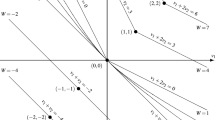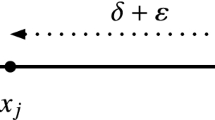Abstract
The paper deals with the characterization of a class of social welfare orderings. The social evaluation functions which represent these orderings are separable in the components of the ordered utility vector. The characterization is based on the Strong Pareto Property, Co-cardinality, Continuity and a new Independence Property. Since this class encompasses the utilitarian rule and since there are members of this family which almost coincide with the rules of rank dictatorship this family bridges the gap between pure utilitarianism and rank dictatorship.
Similar content being viewed by others
References
Aczel, J.: 1966, Lectures on Functional Equations and Their Applications. Academic Press, New York, London.
d'Aspremont, C. and L. Gevers: 1977, ‘Equity and the Informational Basis of Collective Choice’, Review of Economic Studies 44, 199–210.
Debreu, G., 1960, ‘Topological Methods in Cardinal Utility Theory’, in K. J. Arrow, S. Karlin, P. Suppes (eds.), Mathematical Methods in the Social Sciences, Stanford University Press, Stanford.
Deschamps, R. and L. Gevers: 1978, ‘Leximin and Utilitarian Rules: A Joint Characterization’, Journal of Economic Theory 17, 143–163.
Ebert, U.: 1987, ‘A Note on Social Welfare Orderings’, European Economic Review 31, 1145–1147.
Gevers, L.: 1979, ‘On Interpersonal Comparability and Social Welfare Orderings’, Econometrica 47, 75–89.
Maskin, E.: 1978, ‘A Theorem on Utilitarianism’, Review of Economic Studies 45, 93–96.
Roberts, K. W. S.: 1980, ‘Interpersonal Comparability and Social Choice Theory’, Review of Economic Studies 47, 421–439.
Sen, A.: 1974, ‘Rawls versus Bentham: An Axiomatic Examination of the Pure Distribution Problem’, Theory and Decision 4, 301–309.
Sen, A.: 1977, ‘On Weights and Measures: Informational Constraints in Social Welfare Analysis’, Econometrica 45, 1539–1572.
Author information
Authors and Affiliations
Rights and permissions
About this article
Cite this article
Ebert, U. Rawls and Bentham reconciled. Theor Decis 24, 215–223 (1988). https://doi.org/10.1007/BF00148955
Issue Date:
DOI: https://doi.org/10.1007/BF00148955




